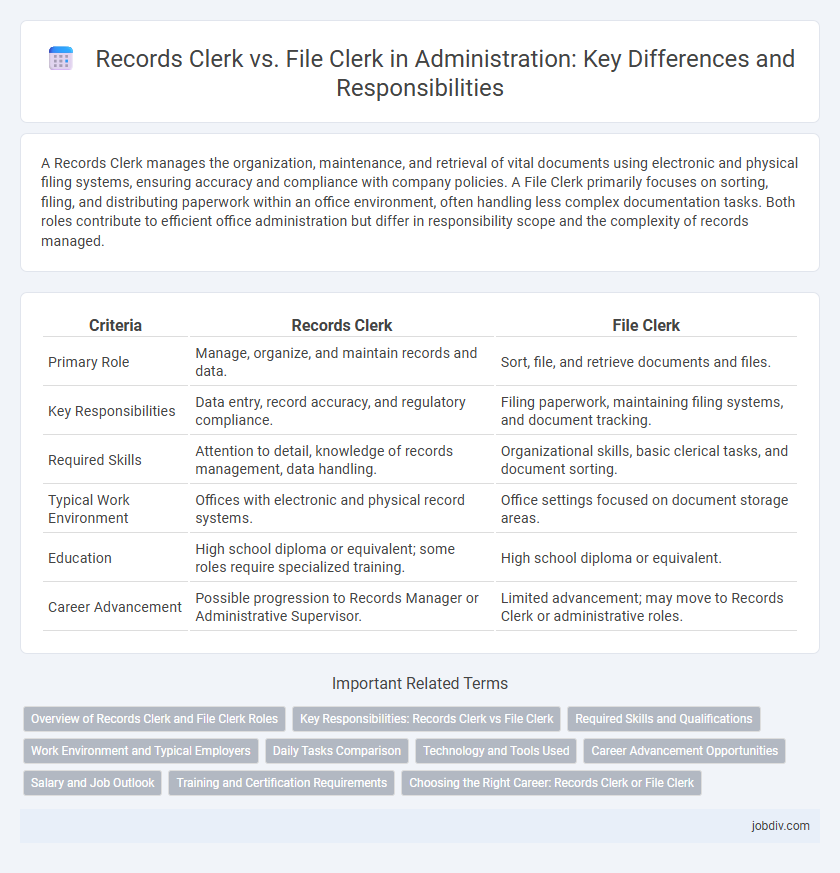A Records Clerk manages the organization, maintenance, and retrieval of vital documents using electronic and physical filing systems, ensuring accuracy and compliance with company policies. A File Clerk primarily focuses on sorting, filing, and distributing paperwork within an office environment, often handling less complex documentation tasks. Both roles contribute to efficient office administration but differ in responsibility scope and the complexity of records managed.
Table of Comparison
| Criteria | Records Clerk | File Clerk |
|---|---|---|
| Primary Role | Manage, organize, and maintain records and data. | Sort, file, and retrieve documents and files. |
| Key Responsibilities | Data entry, record accuracy, and regulatory compliance. | Filing paperwork, maintaining filing systems, and document tracking. |
| Required Skills | Attention to detail, knowledge of records management, data handling. | Organizational skills, basic clerical tasks, and document sorting. |
| Typical Work Environment | Offices with electronic and physical record systems. | Office settings focused on document storage areas. |
| Education | High school diploma or equivalent; some roles require specialized training. | High school diploma or equivalent. |
| Career Advancement | Possible progression to Records Manager or Administrative Supervisor. | Limited advancement; may move to Records Clerk or administrative roles. |
Overview of Records Clerk and File Clerk Roles
Records Clerks manage the organization, maintenance, and retrieval of important documents, ensuring accurate data entry and compliance with retention policies. File Clerks focus primarily on sorting, filing, and maintaining physical or digital records to support efficient document access. Both roles are essential for effective information management within administrative operations.
Key Responsibilities: Records Clerk vs File Clerk
Records Clerks manage the organization, storage, and retrieval of official documents, ensuring compliance with legal and company standards, while File Clerks focus primarily on maintaining and organizing physical or digital filing systems for easy access. The Records Clerk oversees document lifecycle management, including indexing, archiving, and disposal, whereas the File Clerk handles day-to-day filing tasks, updating records, and supporting administrative staff with documentation needs. Efficient collaboration between both roles enhances overall office productivity and information accuracy.
Required Skills and Qualifications
Records Clerks require proficiency in database management and strong organizational abilities to maintain and retrieve official records accurately. File Clerks must possess knowledge of filing systems, attention to detail, and basic computer skills for document sorting and filing tasks. Both roles demand reliability, effective communication skills, and a high level of confidentiality in handling sensitive information.
Work Environment and Typical Employers
Records clerks often work in office settings within healthcare facilities, legal firms, and government agencies, where accurate data management and confidentiality are critical. File clerks typically operate in various administrative environments such as corporate offices, educational institutions, and retail companies, focusing on organizing and maintaining physical and digital files. Both roles demand familiarity with office software and systems but differ in sector-specific requirements and workflow intensity.
Daily Tasks Comparison
Records Clerks manage and organize important documents by creating, updating, and maintaining digital or physical records to ensure data accuracy and accessibility. File Clerks primarily focus on sorting, filing, and retrieving paperwork in filing systems to support efficient office workflow. Both roles require attention to detail, but Records Clerks often handle more complex data entry and record-keeping responsibilities.
Technology and Tools Used
Records clerks utilize advanced electronic document management systems (EDMS) to organize, retrieve, and secure digital records efficiently, often integrating cloud storage solutions and database software. File clerks rely more on traditional filing tools and physical storage solutions like filing cabinets, labels, and barcode scanners to manage paper documents. The adoption of automation technology and optical character recognition (OCR) software significantly enhances records clerks' ability to streamline record-keeping processes compared to file clerks.
Career Advancement Opportunities
Records clerks often have broader responsibilities involving managing and organizing vital company data, which can lead to advancement into roles such as records management specialist or administrative coordinator. File clerks typically focus on the physical organization and retrieval of documents, providing a foundational role that may progress to administrative assistant or office clerk positions. Career advancement for records clerks tends to be more dynamic due to their involvement with digital record-keeping systems and compliance standards.
Salary and Job Outlook
Records Clerks earn a median annual salary of approximately $40,000, with a projected job growth rate of 6% from 2022 to 2032, reflecting steady demand in administrative support roles. File Clerks typically earn slightly less, with an average salary around $35,000 per year, and face a slower job growth rate of about 3%, indicating limited expansion in traditional filing positions. Both roles emphasize organizational skills, but Records Clerks benefit from broader responsibilities and stronger future employment prospects within office administration.
Training and Certification Requirements
Records clerks typically require formal training in records management or administrative support, often supported by certifications such as Certified Records Manager (CRM) or Information Governance certifications. File clerks generally need basic training in organizing and maintaining paper or electronic files, with fewer formal certification requirements, though proficiency in data entry and office software is essential. The specialized knowledge and certification for records clerks position them for more advanced responsibilities in information governance compared to file clerks.
Choosing the Right Career: Records Clerk or File Clerk
Choosing between a Records Clerk and a File Clerk depends on the complexity and scope of document management tasks. Records Clerks handle the organization, maintenance, and retrieval of company records, often requiring knowledge of compliance regulations and database software. File Clerks typically focus on sorting and filing physical and digital documents, making it ideal for roles emphasizing routine data entry and document handling.
Records Clerk vs File Clerk Infographic

 jobdiv.com
jobdiv.com